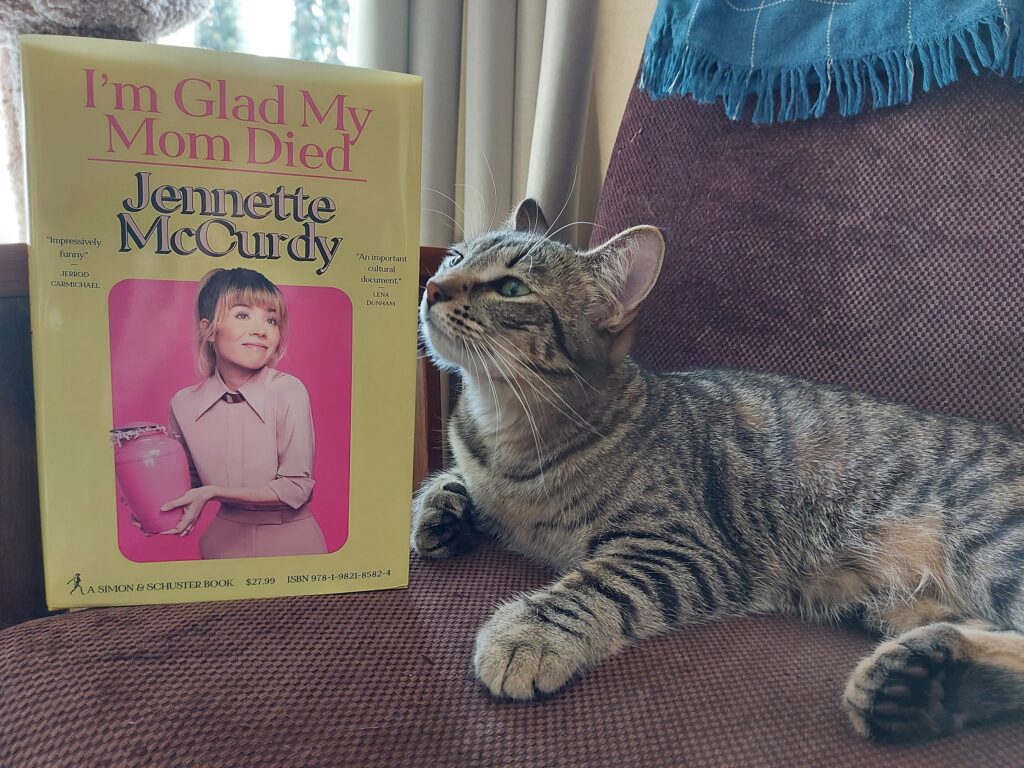I’m Glad My Mom Died by Jennette McCurdy

Apparently, some people are taking offense to the title of Jennette McCurdy’s memoir, I’m Glad My Mom Died. I think we need to end the idea that we owe our mothers our undying love and respect just because they gave birth to us, especially in the case of mothers like Debra McCurdy. Jennette McCurdy’s memoir is an unflinchingly honest look at the relationship between an abusive mother and her daughter and the toxicity of the entertainment industry. Jennette tells her story very matter-of-factly and with humour; she is not looking for your pity. I had been looking forward to reading this book since I first heard about it, and I think it is great. I highly recommend it.
I’m Glad My Mom Died begins when Jennette is six and her mother asks if she wants to become an actress. Jennette says yes, because she would do anything to make her mother happy, but as the years go by, Jennette realizes she really does not like being an actor. Yet if she ever dared to tell her mother this, her mother would emotionally manipulate her into changing her mind.
Debra McCurdy was a narcissist who failed at her own attempt to become an actor, so she lived out her dream vicariously through her daughter. Debra was a cancer survivor in remission for most of Jennette’s life until her cancer came back and eventually killed her, but she liked to use her cancer story to get what she wanted. Debra was emotionally, physically, and even sexually abusive towards Jennette. Debra would clean Jennette in the shower and performed breast and vaginal examines on Jennette until she was seventeen years old. When Jennette did things that Debra did not approve of, Debra would scream at Jennette, throw things at her and call her names like “slut” and “whore”. It felt kind of surreal to read all of this, like I was reading a work of fiction not a memoir. I mean, there is no way a mother would do such horrible things to her own child, right?
For a long time after her mother died, Jennette could not bear the thought of thinking that her mother was a bad person or that she did anything wrong. Jennette believed that everything her mother did was because she loved Jennette and she wanted the best for her. This book is Jennette coming to terms with the fact that her mother was a monster who would never have changed, and if she were still alive today, she would still be making Jennette’s life miserable.
Since I’m Glad My Mom Died has come out, the media has made a lot of Jennette’s experiences with her mother, her time working on iCarly and Sam & Cat, the $300,000 “hush” money Nickelodeon tried to give her when Sam & Cat was cancelled, and Jennette’s feelings towards her co-star, Ariana Grande. However, there is another spectre that looms over Jennette’s life: her relationship with food and body image. Jennette had long term issues with both anorexia and bulimia – and it was her mother who taught her how to be this way, teaching her how to count calories when she was just a child. I’m Glad My Mom Died depicts the horrors of eating disorders and it has given me appreciation for people who suffer from eating disorders and how difficult it is for them to overcome their disorder.
I am very impressed with how Jennette McCurdy can look back on her past with empathy and humour, and how she had the strength of purpose to walk away from being an actor because she knew it was detrimental to her mental and physical health. But she probably would not have been able to do that if her mother was still alive; I’m glad her mom died, too.